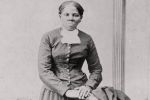In 1982, American actor Vic Morrow and two child actors were killed in a stunt helicopter crash while filming Twilight Zone: The Movie. Based on the sci-fi anthology tv show, the film was highly anticipated with renowned filmmakers like John Landis and Steven Spielberg signed on to produce and co-direct. But this on-set tragedy overshadowed the larger project and led to a contentious wrongful death suit… pursued by Morrow’s daughter, the young Jennifer Jason Leigh.
Videos by Rare
Vic Morrow’s Hollywood Family
Vic Morrow starred in the ABC series Combat! throughout the 1960’s and married screenwriter Barbara Turner in 1958. The couple had two daughters, Carrie Ann Morrow and Jennifer Jason Leigh, born Jennifer Leigh Morrow. Vic Morrow and Barbara Turner divorced two years after the birth of Jennifer Jason Leigh. Though children were raised in Los Angeles, California Morrow was not present in their lives. He and Leigh (who legally changed her name) were estranged at the time of his shocking death.
The Decapitation of Vic Morrow
Twilight Zone: The Movie was split into four distinct segments. Like the TV series, these were meant to feel like isolated episodes. One film episode (in addition to the prologue and epilogue) was directed by John Landis, one by Steven Spielberg, one by Joe Dante, and one by George Miller. Vic Morrow starred in John Landis’ addition, entitled “Time Out,” as a racist named Bill Connors who accidentally travels back in time to World War II and the Vietnam War. In one such mission, Connors meets and attempts to rescue two children, played by seven-year-old Myca Dinh Le and six-year-old Renee Shin-Yi. But shooting the sequence would prove disastrous for all three performers: a calamity much more gruesome than any Twilight Zone episode ever imagined.
Filming for the Vietnamese scenes took place at California’s Indian Dunes near Santa Clarita. But on the morning of July 23, 1982, tragedy struck. Morrow, Le, and Chen were acting out an escape from a pursuant U.S. Army helicopter. As the stunt helicopter hovered above the actors at a mere 24 feet, the heat from special effect pyrotechnic explosions delaminated the rotor blades, causing the helicopter to crash right on top of them. Morrow and Le were decapitated instantly while Chen was crushed by a helicopter skid.
Though Myca Dinh Le and Renee Shin-Yi were edited out of the film completely, Twilight Zone: The Movie was released in 1983 with Vic Morrow remaining in a lead role. Amidst the obvious controversy and horror surrounding the production, Twilight Zone: The Movie received mixed reviews.
The Infamous Court Case
The National Transportation Safety Board investigated the accident, finding that the helicopter’s proximity to the explosive special effects had caused the accident. Further, they concluded that the deadly proximity was due to a failure of communication between the helicopter pilot Dorcey Wingo and the film director John Landis.
Naturally, civil and criminal action was taken against the filmmakers which stretched on for nearly a decade. The parents of Myca Dinh Le and Renee Shin-Yi all testified that they were never made aware of the potential danger with Le’s father Daniel Lee, and others, insisting that he heard John Landis instruct the pilot to “Get lower!” John Landis, Dorcey Wingo, associate producer George Folsey Jr., and production manager Allingham, and explosives specialist Paul Stewart were all tried and acquitted on charges of involuntary manslaughter during a nine-month trial in 1987.
In the trial, John Landis was represented by James F. Neal, who defended Elvis’ shady physician “Dr. Nick.” Jennifer Jason Leigh and her older sister Carrie Ann Morrow sued on behalf of the Morrow family and settled out of court. The terms of this settlement have never been made public. Meanwhile, the children’s’ families of the collected millions of dollars through various civil lawsuits.
Jennifer Jason Leigh generally refuses to discuss the subject. John Landis has spoken about it sparingly and generally refuses to admit much responsibility. As a result, his career suffered and his friendship with co-producer Steven Spielberg never recovered. Spielberg was not technically implicated in the crash on July 23, 1982, but says it was an emotional turning point for every crew member involved in the entire film. In Joseph McBride’s Steven Spielberg: A Biography, he’s quoted saying they were all “sick to the center of our souls.” Spielberg added:
“No movie is worth dying for. I think people are standing up much more now than ever before to producers and directors who ask too much. If something isn’t safe, it’s the right and responsibility of every actor or crew member to yell, ‘Cut!'”


